M&S: Roles of Leaders & Managers, Theories, and Operation Management
VerifiedAdded on 2020/07/22
|12
|4011
|66
Report
AI Summary
This report delves into the crucial aspects of leadership and management within organizations, using Marks & Spencer (M&S) as a case study. It begins by comparing the distinct roles and features of leaders and managers, highlighting their responsibilities in achieving organizational goals. The report then examines how leaders and managers function in various situations, emphasizing the importance of motivation, direction, planning, organizing, staffing, directing, and controlling. Different leadership theories, including situational, system, and contingency theories, are explored to understand their impact on employee performance and organizational effectiveness. Furthermore, the report analyzes key approaches in operation management, such as Just-in-Time and Six Sigma, to improve production efficiency and product quality. The report concludes by assessing factors within an organization that affect operation management, providing a comprehensive understanding of the critical elements for business success.
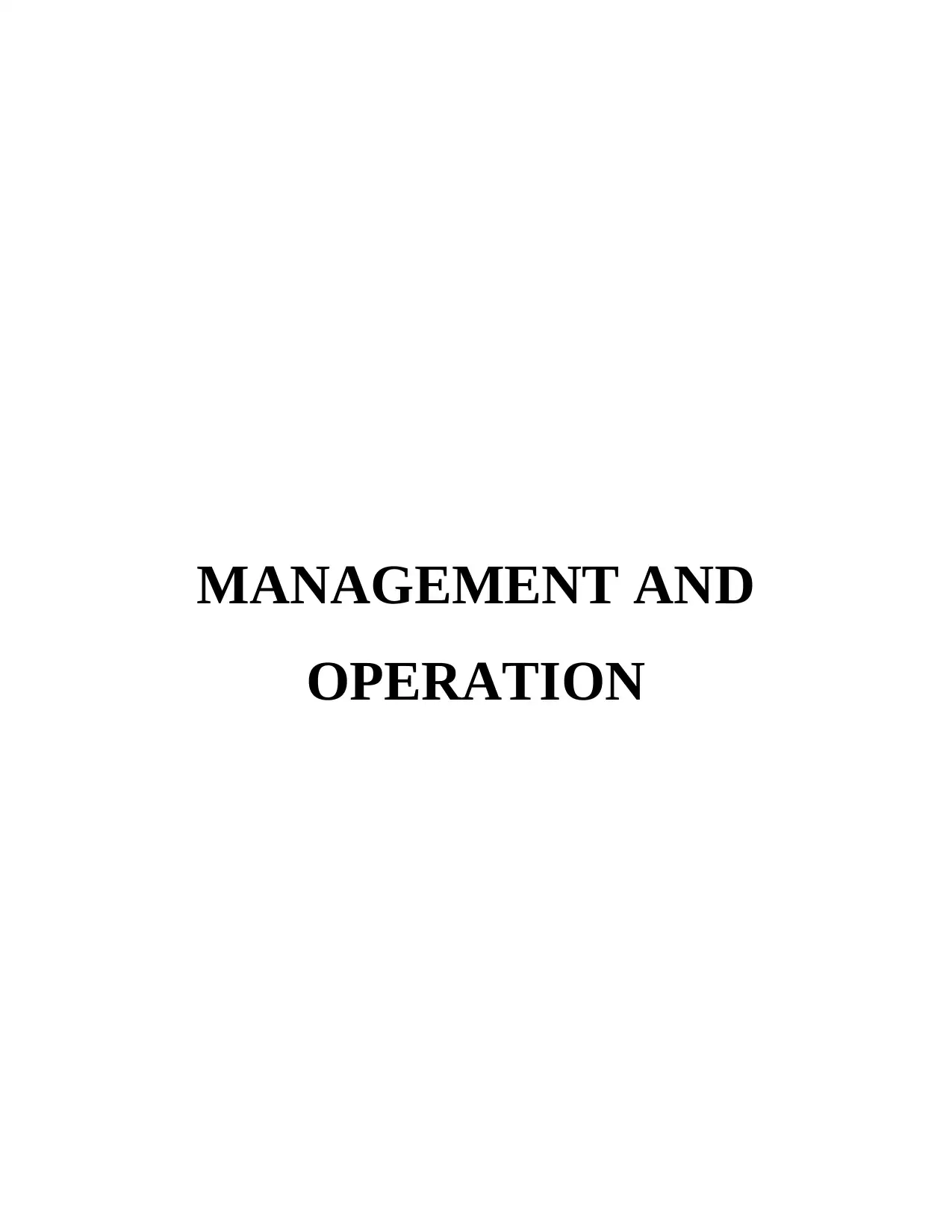
MANAGEMENT AND
OPERATION
OPERATION
Paraphrase This Document
Need a fresh take? Get an instant paraphrase of this document with our AI Paraphraser
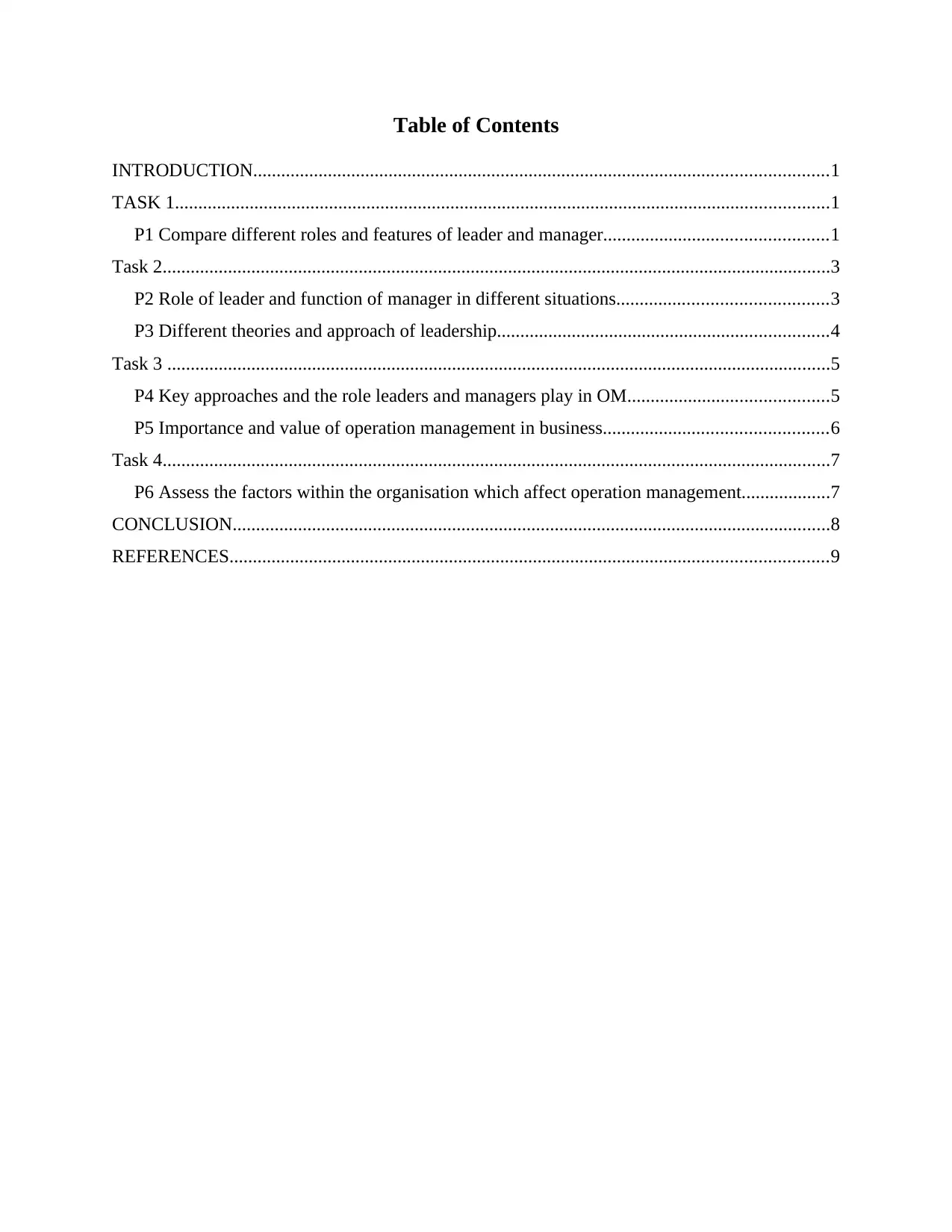
Table of Contents
INTRODUCTION...........................................................................................................................1
TASK 1............................................................................................................................................1
P1 Compare different roles and features of leader and manager................................................1
Task 2...............................................................................................................................................3
P2 Role of leader and function of manager in different situations.............................................3
P3 Different theories and approach of leadership.......................................................................4
Task 3 ..............................................................................................................................................5
P4 Key approaches and the role leaders and managers play in OM...........................................5
P5 Importance and value of operation management in business................................................6
Task 4...............................................................................................................................................7
P6 Assess the factors within the organisation which affect operation management...................7
CONCLUSION................................................................................................................................8
REFERENCES................................................................................................................................9
INTRODUCTION...........................................................................................................................1
TASK 1............................................................................................................................................1
P1 Compare different roles and features of leader and manager................................................1
Task 2...............................................................................................................................................3
P2 Role of leader and function of manager in different situations.............................................3
P3 Different theories and approach of leadership.......................................................................4
Task 3 ..............................................................................................................................................5
P4 Key approaches and the role leaders and managers play in OM...........................................5
P5 Importance and value of operation management in business................................................6
Task 4...............................................................................................................................................7
P6 Assess the factors within the organisation which affect operation management...................7
CONCLUSION................................................................................................................................8
REFERENCES................................................................................................................................9
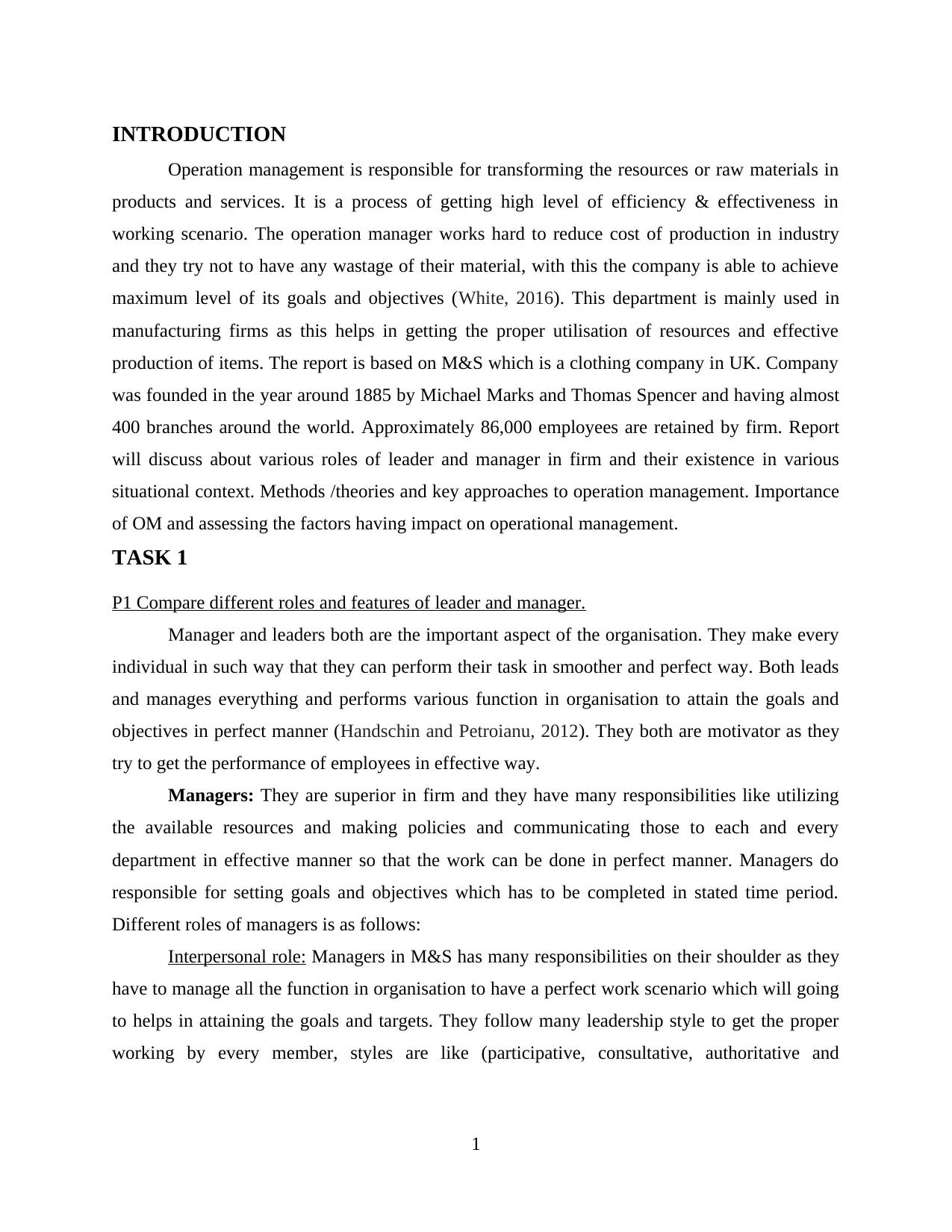
INTRODUCTION
Operation management is responsible for transforming the resources or raw materials in
products and services. It is a process of getting high level of efficiency & effectiveness in
working scenario. The operation manager works hard to reduce cost of production in industry
and they try not to have any wastage of their material, with this the company is able to achieve
maximum level of its goals and objectives (White, 2016). This department is mainly used in
manufacturing firms as this helps in getting the proper utilisation of resources and effective
production of items. The report is based on M&S which is a clothing company in UK. Company
was founded in the year around 1885 by Michael Marks and Thomas Spencer and having almost
400 branches around the world. Approximately 86,000 employees are retained by firm. Report
will discuss about various roles of leader and manager in firm and their existence in various
situational context. Methods /theories and key approaches to operation management. Importance
of OM and assessing the factors having impact on operational management.
TASK 1
P1 Compare different roles and features of leader and manager.
Manager and leaders both are the important aspect of the organisation. They make every
individual in such way that they can perform their task in smoother and perfect way. Both leads
and manages everything and performs various function in organisation to attain the goals and
objectives in perfect manner (Handschin and Petroianu, 2012). They both are motivator as they
try to get the performance of employees in effective way.
Managers: They are superior in firm and they have many responsibilities like utilizing
the available resources and making policies and communicating those to each and every
department in effective manner so that the work can be done in perfect manner. Managers do
responsible for setting goals and objectives which has to be completed in stated time period.
Different roles of managers is as follows:
Interpersonal role: Managers in M&S has many responsibilities on their shoulder as they
have to manage all the function in organisation to have a perfect work scenario which will going
to helps in attaining the goals and targets. They follow many leadership style to get the proper
working by every member, styles are like (participative, consultative, authoritative and
1
Operation management is responsible for transforming the resources or raw materials in
products and services. It is a process of getting high level of efficiency & effectiveness in
working scenario. The operation manager works hard to reduce cost of production in industry
and they try not to have any wastage of their material, with this the company is able to achieve
maximum level of its goals and objectives (White, 2016). This department is mainly used in
manufacturing firms as this helps in getting the proper utilisation of resources and effective
production of items. The report is based on M&S which is a clothing company in UK. Company
was founded in the year around 1885 by Michael Marks and Thomas Spencer and having almost
400 branches around the world. Approximately 86,000 employees are retained by firm. Report
will discuss about various roles of leader and manager in firm and their existence in various
situational context. Methods /theories and key approaches to operation management. Importance
of OM and assessing the factors having impact on operational management.
TASK 1
P1 Compare different roles and features of leader and manager.
Manager and leaders both are the important aspect of the organisation. They make every
individual in such way that they can perform their task in smoother and perfect way. Both leads
and manages everything and performs various function in organisation to attain the goals and
objectives in perfect manner (Handschin and Petroianu, 2012). They both are motivator as they
try to get the performance of employees in effective way.
Managers: They are superior in firm and they have many responsibilities like utilizing
the available resources and making policies and communicating those to each and every
department in effective manner so that the work can be done in perfect manner. Managers do
responsible for setting goals and objectives which has to be completed in stated time period.
Different roles of managers is as follows:
Interpersonal role: Managers in M&S has many responsibilities on their shoulder as they
have to manage all the function in organisation to have a perfect work scenario which will going
to helps in attaining the goals and targets. They follow many leadership style to get the proper
working by every member, styles are like (participative, consultative, authoritative and
1
⊘ This is a preview!⊘
Do you want full access?
Subscribe today to unlock all pages.

Trusted by 1+ million students worldwide
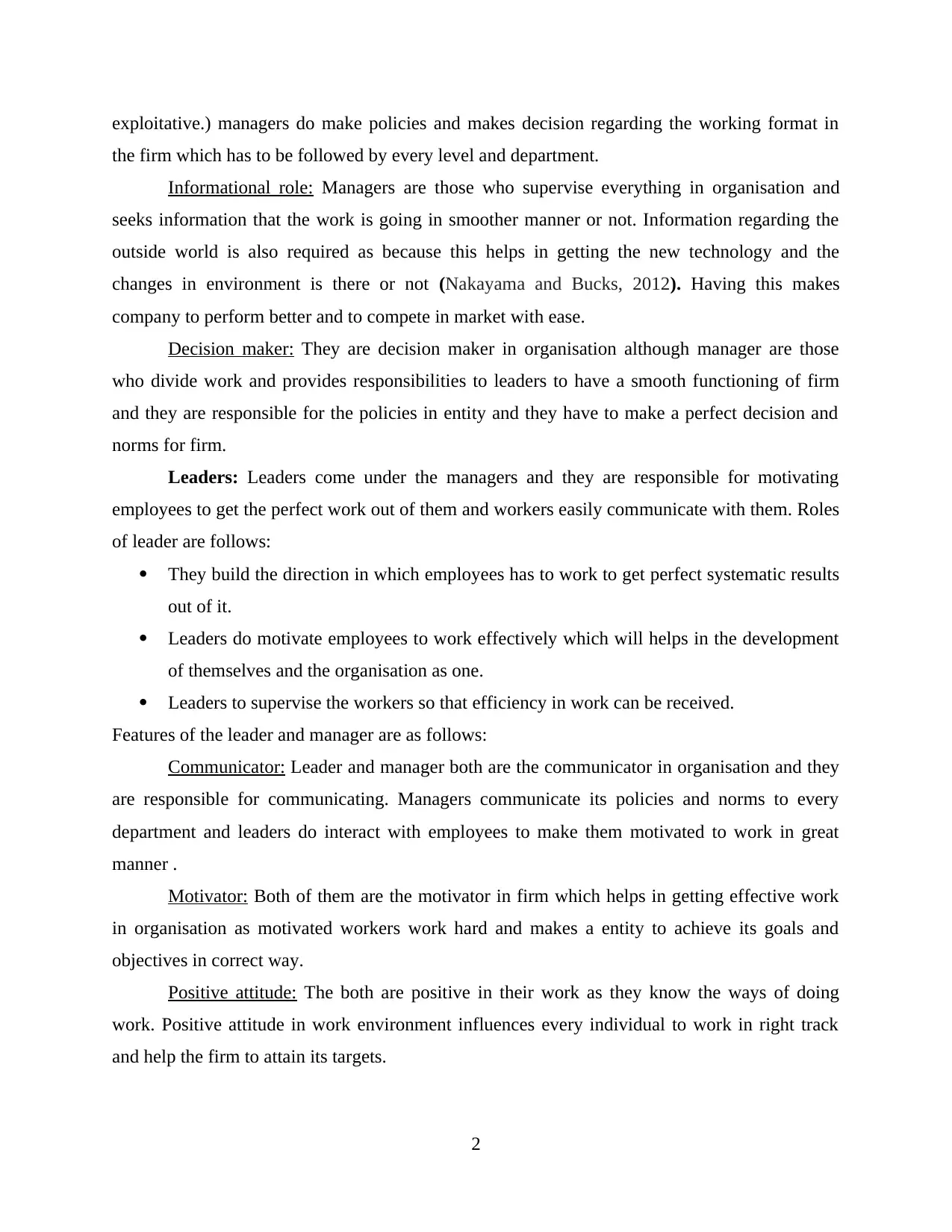
exploitative.) managers do make policies and makes decision regarding the working format in
the firm which has to be followed by every level and department.
Informational role: Managers are those who supervise everything in organisation and
seeks information that the work is going in smoother manner or not. Information regarding the
outside world is also required as because this helps in getting the new technology and the
changes in environment is there or not (Nakayama and Bucks, 2012). Having this makes
company to perform better and to compete in market with ease.
Decision maker: They are decision maker in organisation although manager are those
who divide work and provides responsibilities to leaders to have a smooth functioning of firm
and they are responsible for the policies in entity and they have to make a perfect decision and
norms for firm.
Leaders: Leaders come under the managers and they are responsible for motivating
employees to get the perfect work out of them and workers easily communicate with them. Roles
of leader are follows:
They build the direction in which employees has to work to get perfect systematic results
out of it.
Leaders do motivate employees to work effectively which will helps in the development
of themselves and the organisation as one.
Leaders to supervise the workers so that efficiency in work can be received.
Features of the leader and manager are as follows:
Communicator: Leader and manager both are the communicator in organisation and they
are responsible for communicating. Managers communicate its policies and norms to every
department and leaders do interact with employees to make them motivated to work in great
manner .
Motivator: Both of them are the motivator in firm which helps in getting effective work
in organisation as motivated workers work hard and makes a entity to achieve its goals and
objectives in correct way.
Positive attitude: The both are positive in their work as they know the ways of doing
work. Positive attitude in work environment influences every individual to work in right track
and help the firm to attain its targets.
2
the firm which has to be followed by every level and department.
Informational role: Managers are those who supervise everything in organisation and
seeks information that the work is going in smoother manner or not. Information regarding the
outside world is also required as because this helps in getting the new technology and the
changes in environment is there or not (Nakayama and Bucks, 2012). Having this makes
company to perform better and to compete in market with ease.
Decision maker: They are decision maker in organisation although manager are those
who divide work and provides responsibilities to leaders to have a smooth functioning of firm
and they are responsible for the policies in entity and they have to make a perfect decision and
norms for firm.
Leaders: Leaders come under the managers and they are responsible for motivating
employees to get the perfect work out of them and workers easily communicate with them. Roles
of leader are follows:
They build the direction in which employees has to work to get perfect systematic results
out of it.
Leaders do motivate employees to work effectively which will helps in the development
of themselves and the organisation as one.
Leaders to supervise the workers so that efficiency in work can be received.
Features of the leader and manager are as follows:
Communicator: Leader and manager both are the communicator in organisation and they
are responsible for communicating. Managers communicate its policies and norms to every
department and leaders do interact with employees to make them motivated to work in great
manner .
Motivator: Both of them are the motivator in firm which helps in getting effective work
in organisation as motivated workers work hard and makes a entity to achieve its goals and
objectives in correct way.
Positive attitude: The both are positive in their work as they know the ways of doing
work. Positive attitude in work environment influences every individual to work in right track
and help the firm to attain its targets.
2
Paraphrase This Document
Need a fresh take? Get an instant paraphrase of this document with our AI Paraphraser
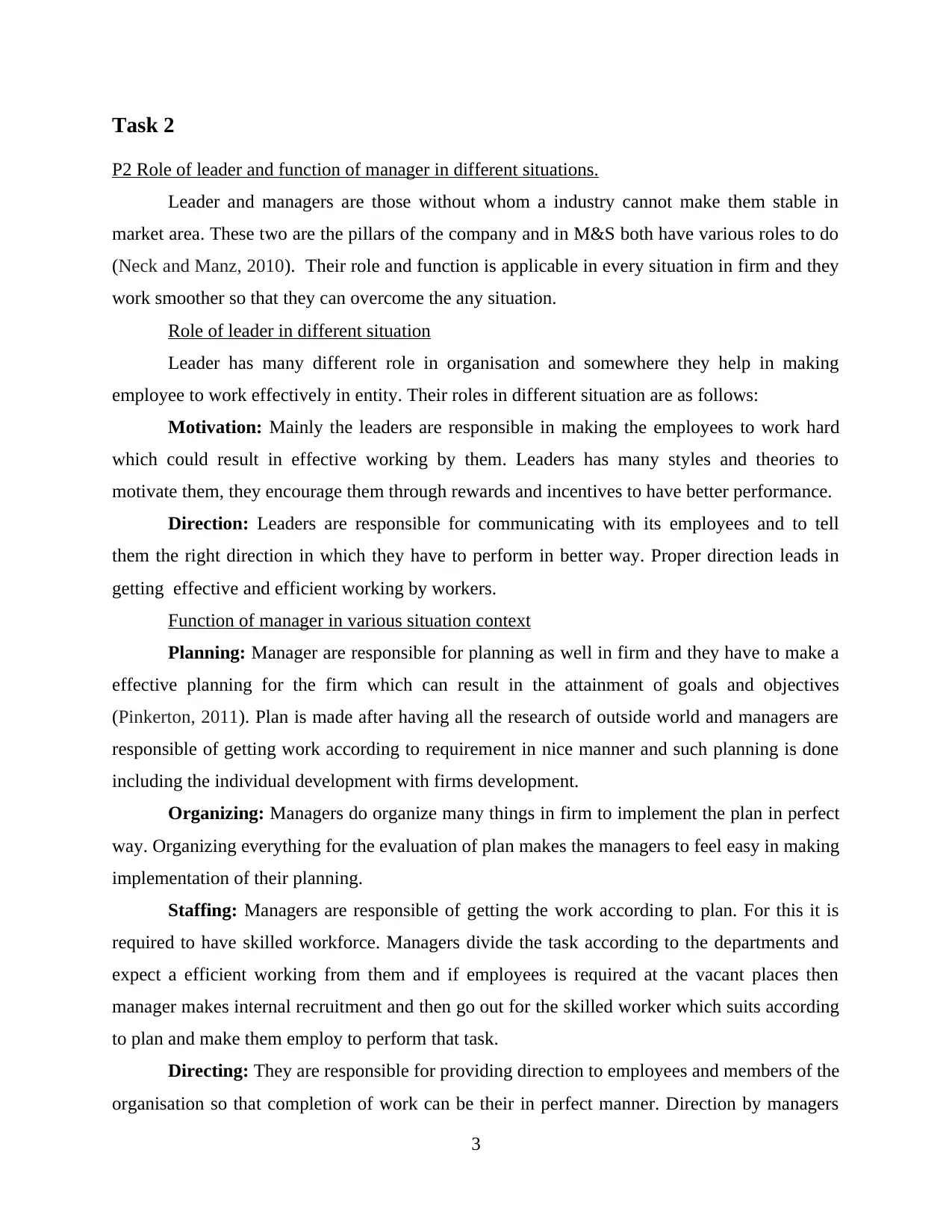
Task 2
P2 Role of leader and function of manager in different situations.
Leader and managers are those without whom a industry cannot make them stable in
market area. These two are the pillars of the company and in M&S both have various roles to do
(Neck and Manz, 2010). Their role and function is applicable in every situation in firm and they
work smoother so that they can overcome the any situation.
Role of leader in different situation
Leader has many different role in organisation and somewhere they help in making
employee to work effectively in entity. Their roles in different situation are as follows:
Motivation: Mainly the leaders are responsible in making the employees to work hard
which could result in effective working by them. Leaders has many styles and theories to
motivate them, they encourage them through rewards and incentives to have better performance.
Direction: Leaders are responsible for communicating with its employees and to tell
them the right direction in which they have to perform in better way. Proper direction leads in
getting effective and efficient working by workers.
Function of manager in various situation context
Planning: Manager are responsible for planning as well in firm and they have to make a
effective planning for the firm which can result in the attainment of goals and objectives
(Pinkerton, 2011). Plan is made after having all the research of outside world and managers are
responsible of getting work according to requirement in nice manner and such planning is done
including the individual development with firms development.
Organizing: Managers do organize many things in firm to implement the plan in perfect
way. Organizing everything for the evaluation of plan makes the managers to feel easy in making
implementation of their planning.
Staffing: Managers are responsible of getting the work according to plan. For this it is
required to have skilled workforce. Managers divide the task according to the departments and
expect a efficient working from them and if employees is required at the vacant places then
manager makes internal recruitment and then go out for the skilled worker which suits according
to plan and make them employ to perform that task.
Directing: They are responsible for providing direction to employees and members of the
organisation so that completion of work can be their in perfect manner. Direction by managers
3
P2 Role of leader and function of manager in different situations.
Leader and managers are those without whom a industry cannot make them stable in
market area. These two are the pillars of the company and in M&S both have various roles to do
(Neck and Manz, 2010). Their role and function is applicable in every situation in firm and they
work smoother so that they can overcome the any situation.
Role of leader in different situation
Leader has many different role in organisation and somewhere they help in making
employee to work effectively in entity. Their roles in different situation are as follows:
Motivation: Mainly the leaders are responsible in making the employees to work hard
which could result in effective working by them. Leaders has many styles and theories to
motivate them, they encourage them through rewards and incentives to have better performance.
Direction: Leaders are responsible for communicating with its employees and to tell
them the right direction in which they have to perform in better way. Proper direction leads in
getting effective and efficient working by workers.
Function of manager in various situation context
Planning: Manager are responsible for planning as well in firm and they have to make a
effective planning for the firm which can result in the attainment of goals and objectives
(Pinkerton, 2011). Plan is made after having all the research of outside world and managers are
responsible of getting work according to requirement in nice manner and such planning is done
including the individual development with firms development.
Organizing: Managers do organize many things in firm to implement the plan in perfect
way. Organizing everything for the evaluation of plan makes the managers to feel easy in making
implementation of their planning.
Staffing: Managers are responsible of getting the work according to plan. For this it is
required to have skilled workforce. Managers divide the task according to the departments and
expect a efficient working from them and if employees is required at the vacant places then
manager makes internal recruitment and then go out for the skilled worker which suits according
to plan and make them employ to perform that task.
Directing: They are responsible for providing direction to employees and members of the
organisation so that completion of work can be their in perfect manner. Direction by managers
3
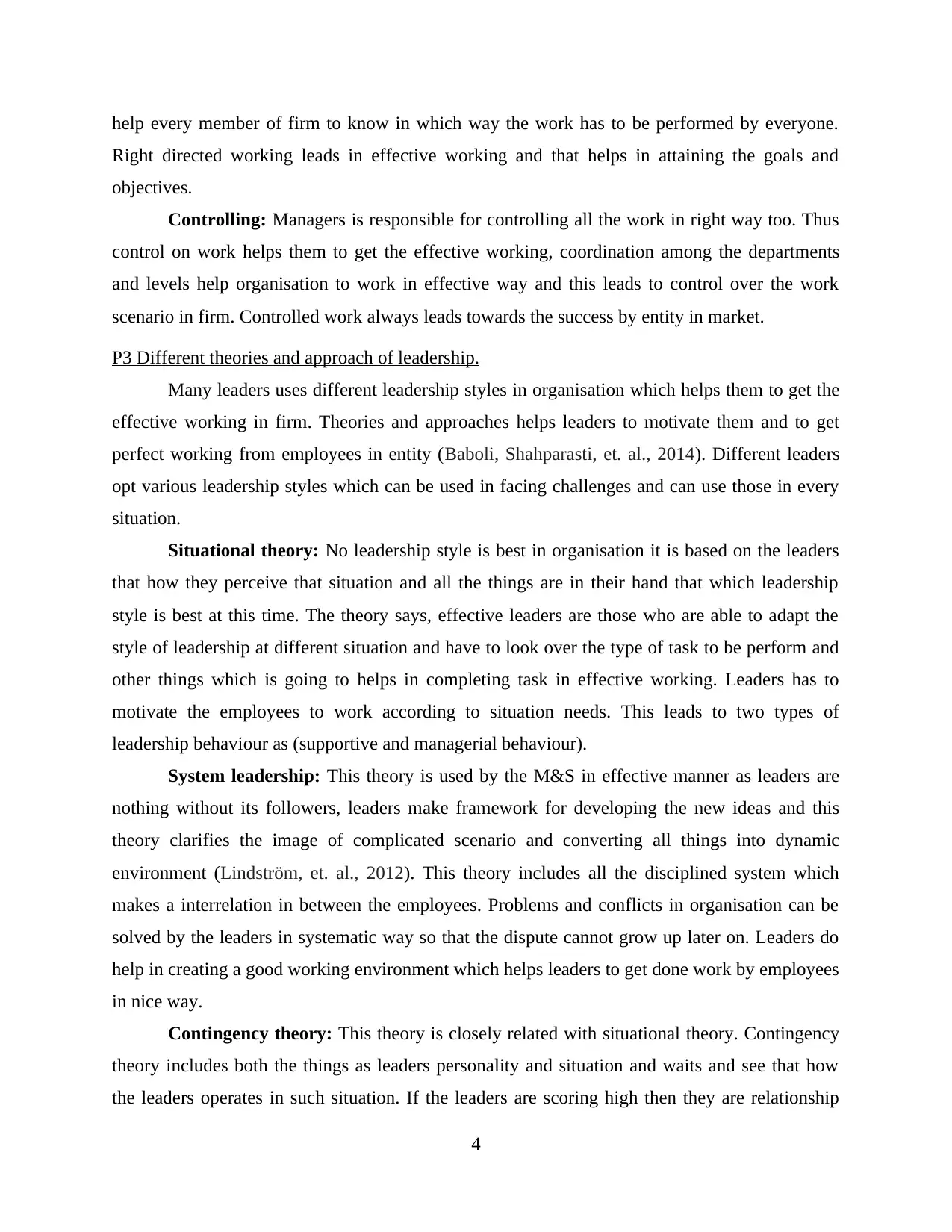
help every member of firm to know in which way the work has to be performed by everyone.
Right directed working leads in effective working and that helps in attaining the goals and
objectives.
Controlling: Managers is responsible for controlling all the work in right way too. Thus
control on work helps them to get the effective working, coordination among the departments
and levels help organisation to work in effective way and this leads to control over the work
scenario in firm. Controlled work always leads towards the success by entity in market.
P3 Different theories and approach of leadership.
Many leaders uses different leadership styles in organisation which helps them to get the
effective working in firm. Theories and approaches helps leaders to motivate them and to get
perfect working from employees in entity (Baboli, Shahparasti, et. al., 2014). Different leaders
opt various leadership styles which can be used in facing challenges and can use those in every
situation.
Situational theory: No leadership style is best in organisation it is based on the leaders
that how they perceive that situation and all the things are in their hand that which leadership
style is best at this time. The theory says, effective leaders are those who are able to adapt the
style of leadership at different situation and have to look over the type of task to be perform and
other things which is going to helps in completing task in effective working. Leaders has to
motivate the employees to work according to situation needs. This leads to two types of
leadership behaviour as (supportive and managerial behaviour).
System leadership: This theory is used by the M&S in effective manner as leaders are
nothing without its followers, leaders make framework for developing the new ideas and this
theory clarifies the image of complicated scenario and converting all things into dynamic
environment (Lindström, et. al., 2012). This theory includes all the disciplined system which
makes a interrelation in between the employees. Problems and conflicts in organisation can be
solved by the leaders in systematic way so that the dispute cannot grow up later on. Leaders do
help in creating a good working environment which helps leaders to get done work by employees
in nice way.
Contingency theory: This theory is closely related with situational theory. Contingency
theory includes both the things as leaders personality and situation and waits and see that how
the leaders operates in such situation. If the leaders are scoring high then they are relationship
4
Right directed working leads in effective working and that helps in attaining the goals and
objectives.
Controlling: Managers is responsible for controlling all the work in right way too. Thus
control on work helps them to get the effective working, coordination among the departments
and levels help organisation to work in effective way and this leads to control over the work
scenario in firm. Controlled work always leads towards the success by entity in market.
P3 Different theories and approach of leadership.
Many leaders uses different leadership styles in organisation which helps them to get the
effective working in firm. Theories and approaches helps leaders to motivate them and to get
perfect working from employees in entity (Baboli, Shahparasti, et. al., 2014). Different leaders
opt various leadership styles which can be used in facing challenges and can use those in every
situation.
Situational theory: No leadership style is best in organisation it is based on the leaders
that how they perceive that situation and all the things are in their hand that which leadership
style is best at this time. The theory says, effective leaders are those who are able to adapt the
style of leadership at different situation and have to look over the type of task to be perform and
other things which is going to helps in completing task in effective working. Leaders has to
motivate the employees to work according to situation needs. This leads to two types of
leadership behaviour as (supportive and managerial behaviour).
System leadership: This theory is used by the M&S in effective manner as leaders are
nothing without its followers, leaders make framework for developing the new ideas and this
theory clarifies the image of complicated scenario and converting all things into dynamic
environment (Lindström, et. al., 2012). This theory includes all the disciplined system which
makes a interrelation in between the employees. Problems and conflicts in organisation can be
solved by the leaders in systematic way so that the dispute cannot grow up later on. Leaders do
help in creating a good working environment which helps leaders to get done work by employees
in nice way.
Contingency theory: This theory is closely related with situational theory. Contingency
theory includes both the things as leaders personality and situation and waits and see that how
the leaders operates in such situation. If the leaders are scoring high then they are relationship
4
⊘ This is a preview!⊘
Do you want full access?
Subscribe today to unlock all pages.

Trusted by 1+ million students worldwide
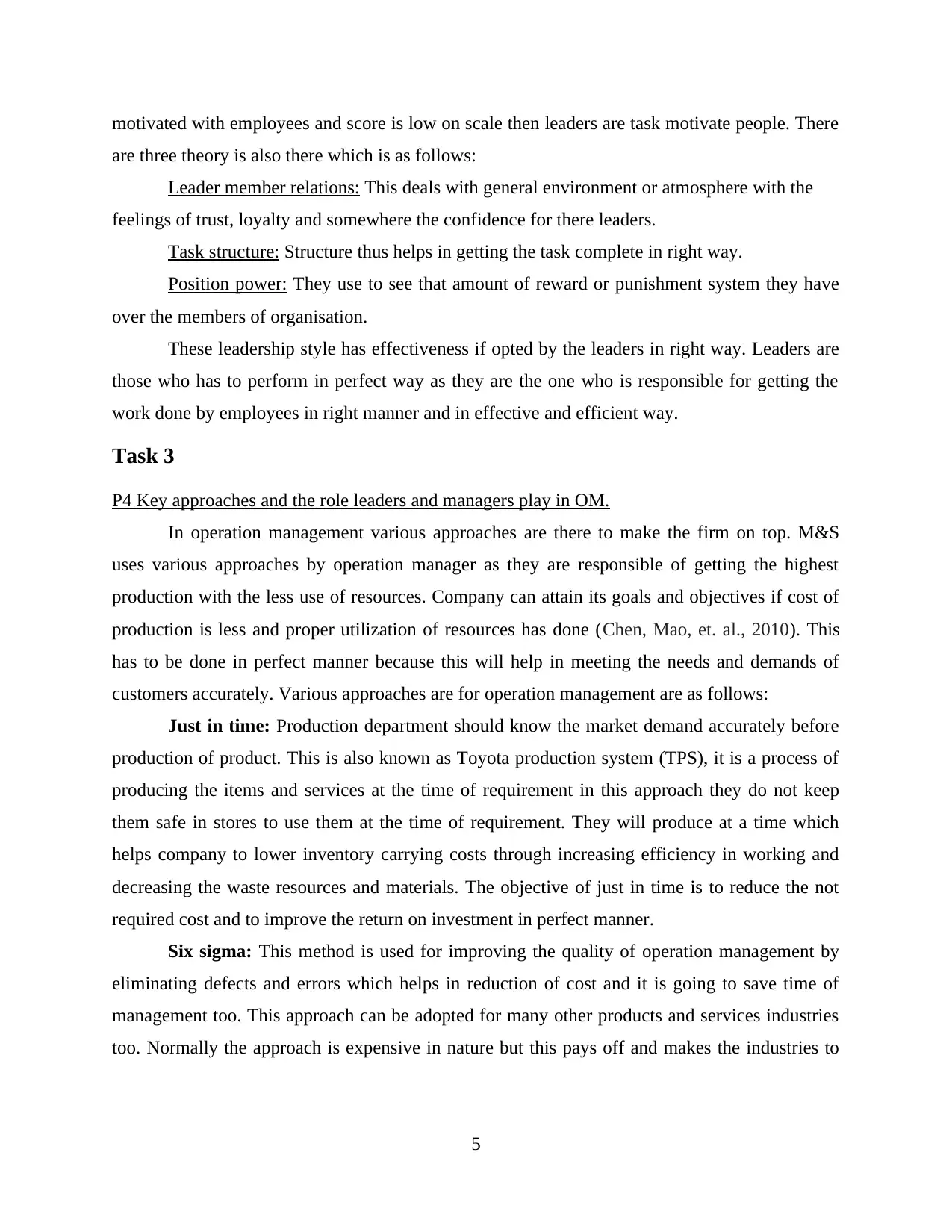
motivated with employees and score is low on scale then leaders are task motivate people. There
are three theory is also there which is as follows:
Leader member relations: This deals with general environment or atmosphere with the
feelings of trust, loyalty and somewhere the confidence for there leaders.
Task structure: Structure thus helps in getting the task complete in right way.
Position power: They use to see that amount of reward or punishment system they have
over the members of organisation.
These leadership style has effectiveness if opted by the leaders in right way. Leaders are
those who has to perform in perfect way as they are the one who is responsible for getting the
work done by employees in right manner and in effective and efficient way.
Task 3
P4 Key approaches and the role leaders and managers play in OM.
In operation management various approaches are there to make the firm on top. M&S
uses various approaches by operation manager as they are responsible of getting the highest
production with the less use of resources. Company can attain its goals and objectives if cost of
production is less and proper utilization of resources has done (Chen, Mao, et. al., 2010). This
has to be done in perfect manner because this will help in meeting the needs and demands of
customers accurately. Various approaches are for operation management are as follows:
Just in time: Production department should know the market demand accurately before
production of product. This is also known as Toyota production system (TPS), it is a process of
producing the items and services at the time of requirement in this approach they do not keep
them safe in stores to use them at the time of requirement. They will produce at a time which
helps company to lower inventory carrying costs through increasing efficiency in working and
decreasing the waste resources and materials. The objective of just in time is to reduce the not
required cost and to improve the return on investment in perfect manner.
Six sigma: This method is used for improving the quality of operation management by
eliminating defects and errors which helps in reduction of cost and it is going to save time of
management too. This approach can be adopted for many other products and services industries
too. Normally the approach is expensive in nature but this pays off and makes the industries to
5
are three theory is also there which is as follows:
Leader member relations: This deals with general environment or atmosphere with the
feelings of trust, loyalty and somewhere the confidence for there leaders.
Task structure: Structure thus helps in getting the task complete in right way.
Position power: They use to see that amount of reward or punishment system they have
over the members of organisation.
These leadership style has effectiveness if opted by the leaders in right way. Leaders are
those who has to perform in perfect way as they are the one who is responsible for getting the
work done by employees in right manner and in effective and efficient way.
Task 3
P4 Key approaches and the role leaders and managers play in OM.
In operation management various approaches are there to make the firm on top. M&S
uses various approaches by operation manager as they are responsible of getting the highest
production with the less use of resources. Company can attain its goals and objectives if cost of
production is less and proper utilization of resources has done (Chen, Mao, et. al., 2010). This
has to be done in perfect manner because this will help in meeting the needs and demands of
customers accurately. Various approaches are for operation management are as follows:
Just in time: Production department should know the market demand accurately before
production of product. This is also known as Toyota production system (TPS), it is a process of
producing the items and services at the time of requirement in this approach they do not keep
them safe in stores to use them at the time of requirement. They will produce at a time which
helps company to lower inventory carrying costs through increasing efficiency in working and
decreasing the waste resources and materials. The objective of just in time is to reduce the not
required cost and to improve the return on investment in perfect manner.
Six sigma: This method is used for improving the quality of operation management by
eliminating defects and errors which helps in reduction of cost and it is going to save time of
management too. This approach can be adopted for many other products and services industries
too. Normally the approach is expensive in nature but this pays off and makes the industries to
5
Paraphrase This Document
Need a fresh take? Get an instant paraphrase of this document with our AI Paraphraser
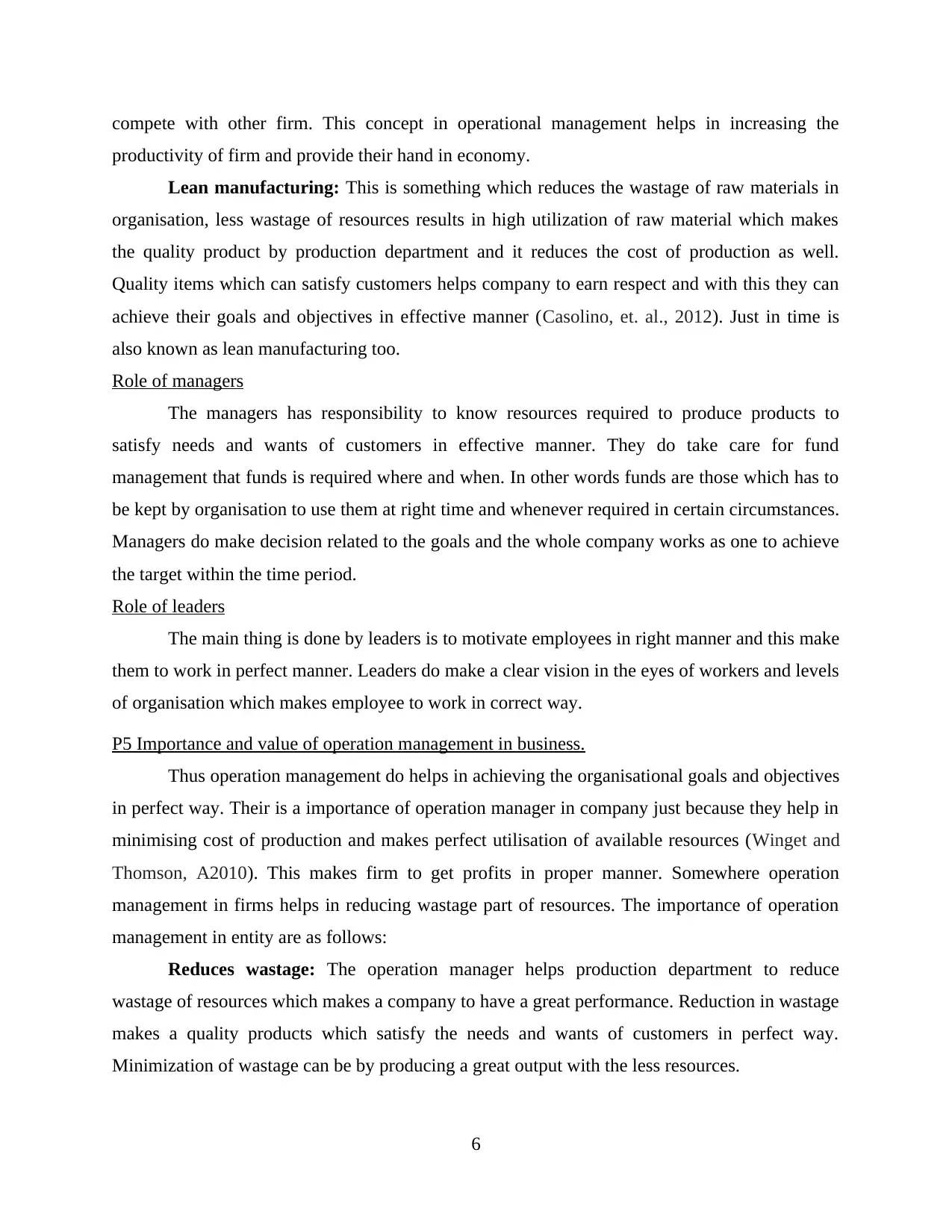
compete with other firm. This concept in operational management helps in increasing the
productivity of firm and provide their hand in economy.
Lean manufacturing: This is something which reduces the wastage of raw materials in
organisation, less wastage of resources results in high utilization of raw material which makes
the quality product by production department and it reduces the cost of production as well.
Quality items which can satisfy customers helps company to earn respect and with this they can
achieve their goals and objectives in effective manner (Casolino, et. al., 2012). Just in time is
also known as lean manufacturing too.
Role of managers
The managers has responsibility to know resources required to produce products to
satisfy needs and wants of customers in effective manner. They do take care for fund
management that funds is required where and when. In other words funds are those which has to
be kept by organisation to use them at right time and whenever required in certain circumstances.
Managers do make decision related to the goals and the whole company works as one to achieve
the target within the time period.
Role of leaders
The main thing is done by leaders is to motivate employees in right manner and this make
them to work in perfect manner. Leaders do make a clear vision in the eyes of workers and levels
of organisation which makes employee to work in correct way.
P5 Importance and value of operation management in business.
Thus operation management do helps in achieving the organisational goals and objectives
in perfect way. Their is a importance of operation manager in company just because they help in
minimising cost of production and makes perfect utilisation of available resources (Winget and
Thomson, A2010). This makes firm to get profits in proper manner. Somewhere operation
management in firms helps in reducing wastage part of resources. The importance of operation
management in entity are as follows:
Reduces wastage: The operation manager helps production department to reduce
wastage of resources which makes a company to have a great performance. Reduction in wastage
makes a quality products which satisfy the needs and wants of customers in perfect way.
Minimization of wastage can be by producing a great output with the less resources.
6
productivity of firm and provide their hand in economy.
Lean manufacturing: This is something which reduces the wastage of raw materials in
organisation, less wastage of resources results in high utilization of raw material which makes
the quality product by production department and it reduces the cost of production as well.
Quality items which can satisfy customers helps company to earn respect and with this they can
achieve their goals and objectives in effective manner (Casolino, et. al., 2012). Just in time is
also known as lean manufacturing too.
Role of managers
The managers has responsibility to know resources required to produce products to
satisfy needs and wants of customers in effective manner. They do take care for fund
management that funds is required where and when. In other words funds are those which has to
be kept by organisation to use them at right time and whenever required in certain circumstances.
Managers do make decision related to the goals and the whole company works as one to achieve
the target within the time period.
Role of leaders
The main thing is done by leaders is to motivate employees in right manner and this make
them to work in perfect manner. Leaders do make a clear vision in the eyes of workers and levels
of organisation which makes employee to work in correct way.
P5 Importance and value of operation management in business.
Thus operation management do helps in achieving the organisational goals and objectives
in perfect way. Their is a importance of operation manager in company just because they help in
minimising cost of production and makes perfect utilisation of available resources (Winget and
Thomson, A2010). This makes firm to get profits in proper manner. Somewhere operation
management in firms helps in reducing wastage part of resources. The importance of operation
management in entity are as follows:
Reduces wastage: The operation manager helps production department to reduce
wastage of resources which makes a company to have a great performance. Reduction in wastage
makes a quality products which satisfy the needs and wants of customers in perfect way.
Minimization of wastage can be by producing a great output with the less resources.
6
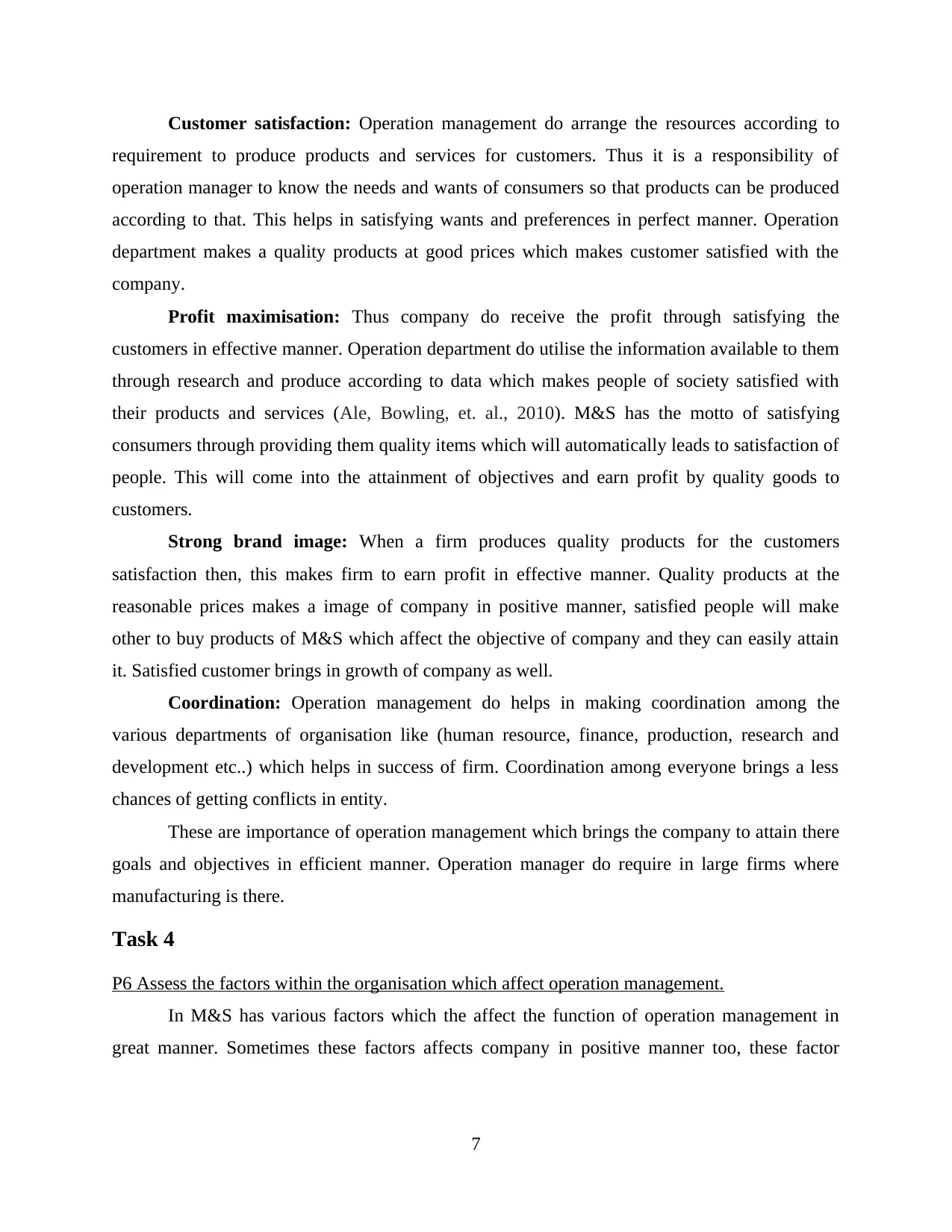
Customer satisfaction: Operation management do arrange the resources according to
requirement to produce products and services for customers. Thus it is a responsibility of
operation manager to know the needs and wants of consumers so that products can be produced
according to that. This helps in satisfying wants and preferences in perfect manner. Operation
department makes a quality products at good prices which makes customer satisfied with the
company.
Profit maximisation: Thus company do receive the profit through satisfying the
customers in effective manner. Operation department do utilise the information available to them
through research and produce according to data which makes people of society satisfied with
their products and services (Ale, Bowling, et. al., 2010). M&S has the motto of satisfying
consumers through providing them quality items which will automatically leads to satisfaction of
people. This will come into the attainment of objectives and earn profit by quality goods to
customers.
Strong brand image: When a firm produces quality products for the customers
satisfaction then, this makes firm to earn profit in effective manner. Quality products at the
reasonable prices makes a image of company in positive manner, satisfied people will make
other to buy products of M&S which affect the objective of company and they can easily attain
it. Satisfied customer brings in growth of company as well.
Coordination: Operation management do helps in making coordination among the
various departments of organisation like (human resource, finance, production, research and
development etc..) which helps in success of firm. Coordination among everyone brings a less
chances of getting conflicts in entity.
These are importance of operation management which brings the company to attain there
goals and objectives in efficient manner. Operation manager do require in large firms where
manufacturing is there.
Task 4
P6 Assess the factors within the organisation which affect operation management.
In M&S has various factors which the affect the function of operation management in
great manner. Sometimes these factors affects company in positive manner too, these factor
7
requirement to produce products and services for customers. Thus it is a responsibility of
operation manager to know the needs and wants of consumers so that products can be produced
according to that. This helps in satisfying wants and preferences in perfect manner. Operation
department makes a quality products at good prices which makes customer satisfied with the
company.
Profit maximisation: Thus company do receive the profit through satisfying the
customers in effective manner. Operation department do utilise the information available to them
through research and produce according to data which makes people of society satisfied with
their products and services (Ale, Bowling, et. al., 2010). M&S has the motto of satisfying
consumers through providing them quality items which will automatically leads to satisfaction of
people. This will come into the attainment of objectives and earn profit by quality goods to
customers.
Strong brand image: When a firm produces quality products for the customers
satisfaction then, this makes firm to earn profit in effective manner. Quality products at the
reasonable prices makes a image of company in positive manner, satisfied people will make
other to buy products of M&S which affect the objective of company and they can easily attain
it. Satisfied customer brings in growth of company as well.
Coordination: Operation management do helps in making coordination among the
various departments of organisation like (human resource, finance, production, research and
development etc..) which helps in success of firm. Coordination among everyone brings a less
chances of getting conflicts in entity.
These are importance of operation management which brings the company to attain there
goals and objectives in efficient manner. Operation manager do require in large firms where
manufacturing is there.
Task 4
P6 Assess the factors within the organisation which affect operation management.
In M&S has various factors which the affect the function of operation management in
great manner. Sometimes these factors affects company in positive manner too, these factor
7
⊘ This is a preview!⊘
Do you want full access?
Subscribe today to unlock all pages.

Trusted by 1+ million students worldwide
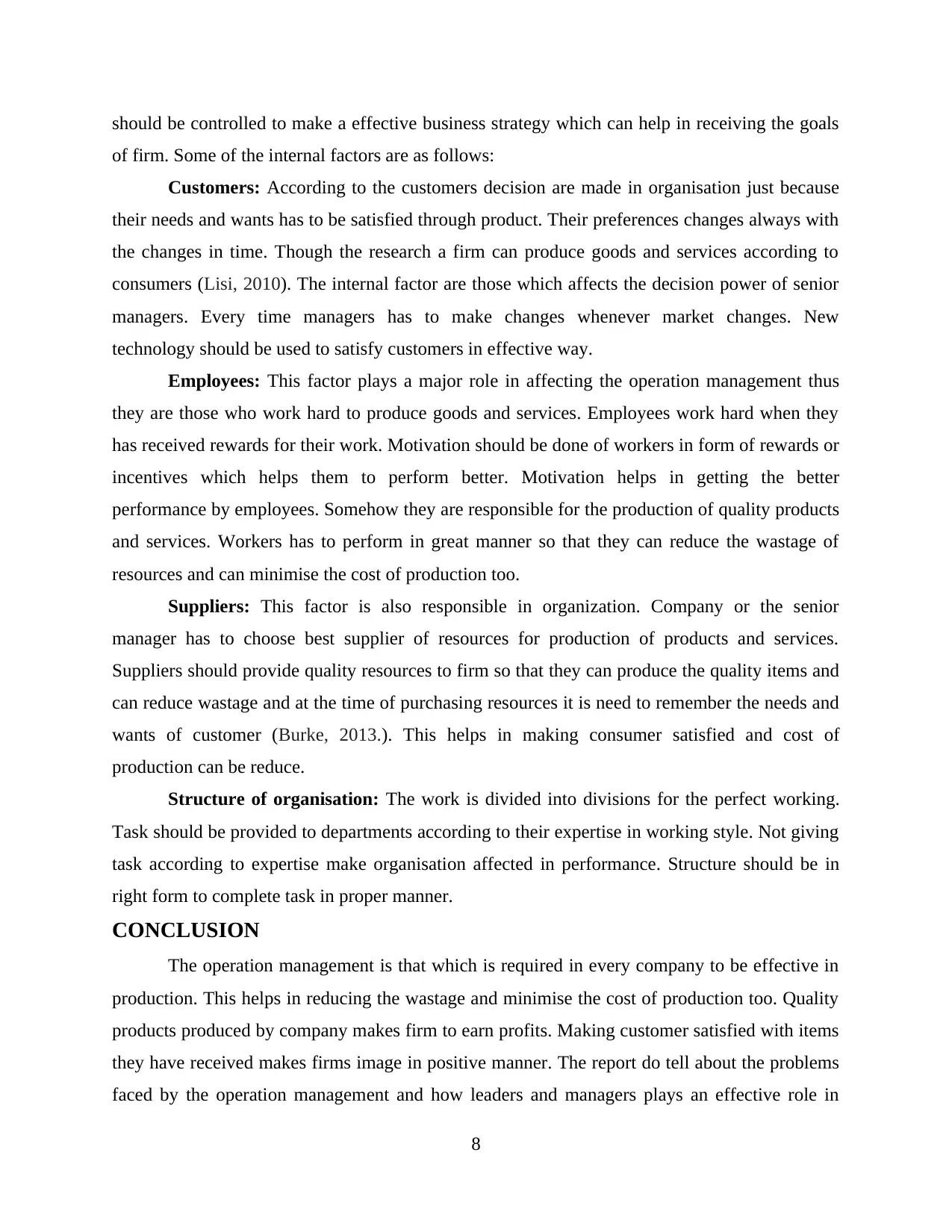
should be controlled to make a effective business strategy which can help in receiving the goals
of firm. Some of the internal factors are as follows:
Customers: According to the customers decision are made in organisation just because
their needs and wants has to be satisfied through product. Their preferences changes always with
the changes in time. Though the research a firm can produce goods and services according to
consumers (Lisi, 2010). The internal factor are those which affects the decision power of senior
managers. Every time managers has to make changes whenever market changes. New
technology should be used to satisfy customers in effective way.
Employees: This factor plays a major role in affecting the operation management thus
they are those who work hard to produce goods and services. Employees work hard when they
has received rewards for their work. Motivation should be done of workers in form of rewards or
incentives which helps them to perform better. Motivation helps in getting the better
performance by employees. Somehow they are responsible for the production of quality products
and services. Workers has to perform in great manner so that they can reduce the wastage of
resources and can minimise the cost of production too.
Suppliers: This factor is also responsible in organization. Company or the senior
manager has to choose best supplier of resources for production of products and services.
Suppliers should provide quality resources to firm so that they can produce the quality items and
can reduce wastage and at the time of purchasing resources it is need to remember the needs and
wants of customer (Burke, 2013.). This helps in making consumer satisfied and cost of
production can be reduce.
Structure of organisation: The work is divided into divisions for the perfect working.
Task should be provided to departments according to their expertise in working style. Not giving
task according to expertise make organisation affected in performance. Structure should be in
right form to complete task in proper manner.
CONCLUSION
The operation management is that which is required in every company to be effective in
production. This helps in reducing the wastage and minimise the cost of production too. Quality
products produced by company makes firm to earn profits. Making customer satisfied with items
they have received makes firms image in positive manner. The report do tell about the problems
faced by the operation management and how leaders and managers plays an effective role in
8
of firm. Some of the internal factors are as follows:
Customers: According to the customers decision are made in organisation just because
their needs and wants has to be satisfied through product. Their preferences changes always with
the changes in time. Though the research a firm can produce goods and services according to
consumers (Lisi, 2010). The internal factor are those which affects the decision power of senior
managers. Every time managers has to make changes whenever market changes. New
technology should be used to satisfy customers in effective way.
Employees: This factor plays a major role in affecting the operation management thus
they are those who work hard to produce goods and services. Employees work hard when they
has received rewards for their work. Motivation should be done of workers in form of rewards or
incentives which helps them to perform better. Motivation helps in getting the better
performance by employees. Somehow they are responsible for the production of quality products
and services. Workers has to perform in great manner so that they can reduce the wastage of
resources and can minimise the cost of production too.
Suppliers: This factor is also responsible in organization. Company or the senior
manager has to choose best supplier of resources for production of products and services.
Suppliers should provide quality resources to firm so that they can produce the quality items and
can reduce wastage and at the time of purchasing resources it is need to remember the needs and
wants of customer (Burke, 2013.). This helps in making consumer satisfied and cost of
production can be reduce.
Structure of organisation: The work is divided into divisions for the perfect working.
Task should be provided to departments according to their expertise in working style. Not giving
task according to expertise make organisation affected in performance. Structure should be in
right form to complete task in proper manner.
CONCLUSION
The operation management is that which is required in every company to be effective in
production. This helps in reducing the wastage and minimise the cost of production too. Quality
products produced by company makes firm to earn profits. Making customer satisfied with items
they have received makes firms image in positive manner. The report do tell about the problems
faced by the operation management and how leaders and managers plays an effective role in
8
Paraphrase This Document
Need a fresh take? Get an instant paraphrase of this document with our AI Paraphraser
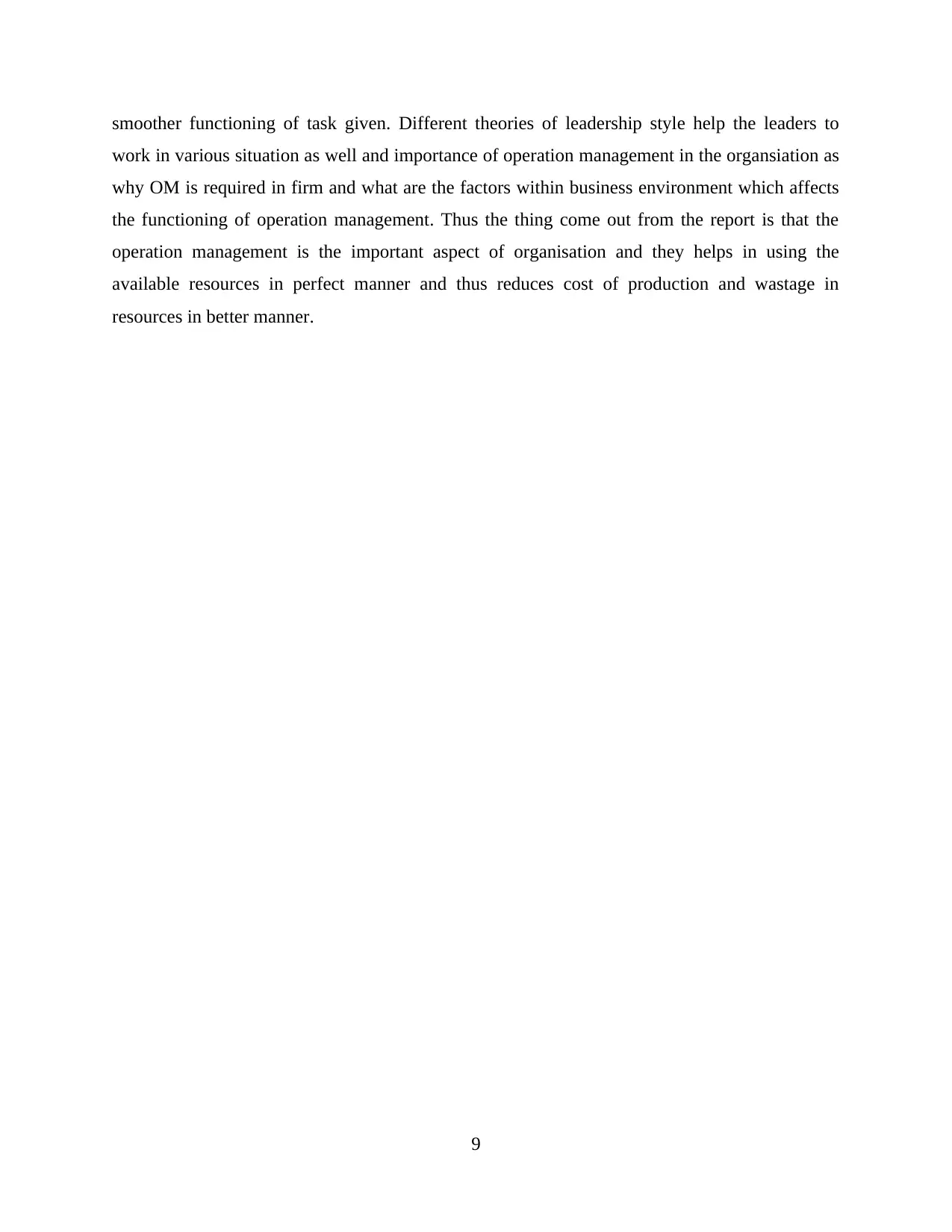
smoother functioning of task given. Different theories of leadership style help the leaders to
work in various situation as well and importance of operation management in the organsiation as
why OM is required in firm and what are the factors within business environment which affects
the functioning of operation management. Thus the thing come out from the report is that the
operation management is the important aspect of organisation and they helps in using the
available resources in perfect manner and thus reduces cost of production and wastage in
resources in better manner.
9
work in various situation as well and importance of operation management in the organsiation as
why OM is required in firm and what are the factors within business environment which affects
the functioning of operation management. Thus the thing come out from the report is that the
operation management is the important aspect of organisation and they helps in using the
available resources in perfect manner and thus reduces cost of production and wastage in
resources in better manner.
9
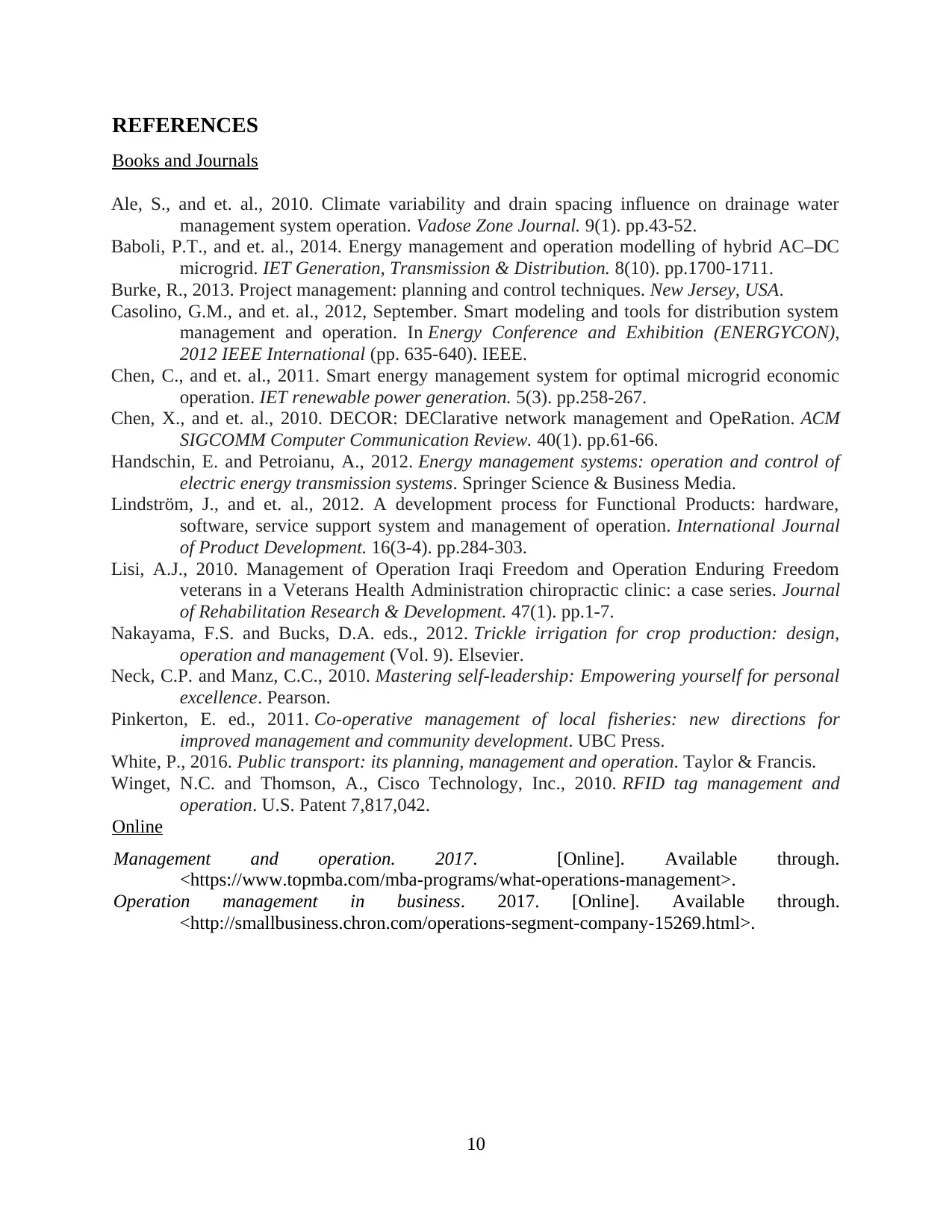
REFERENCES
Books and Journals
Ale, S., and et. al., 2010. Climate variability and drain spacing influence on drainage water
management system operation. Vadose Zone Journal. 9(1). pp.43-52.
Baboli, P.T., and et. al., 2014. Energy management and operation modelling of hybrid AC–DC
microgrid. IET Generation, Transmission & Distribution. 8(10). pp.1700-1711.
Burke, R., 2013. Project management: planning and control techniques. New Jersey, USA.
Casolino, G.M., and et. al., 2012, September. Smart modeling and tools for distribution system
management and operation. In Energy Conference and Exhibition (ENERGYCON),
2012 IEEE International (pp. 635-640). IEEE.
Chen, C., and et. al., 2011. Smart energy management system for optimal microgrid economic
operation. IET renewable power generation. 5(3). pp.258-267.
Chen, X., and et. al., 2010. DECOR: DEClarative network management and OpeRation. ACM
SIGCOMM Computer Communication Review. 40(1). pp.61-66.
Handschin, E. and Petroianu, A., 2012. Energy management systems: operation and control of
electric energy transmission systems. Springer Science & Business Media.
Lindström, J., and et. al., 2012. A development process for Functional Products: hardware,
software, service support system and management of operation. International Journal
of Product Development. 16(3-4). pp.284-303.
Lisi, A.J., 2010. Management of Operation Iraqi Freedom and Operation Enduring Freedom
veterans in a Veterans Health Administration chiropractic clinic: a case series. Journal
of Rehabilitation Research & Development. 47(1). pp.1-7.
Nakayama, F.S. and Bucks, D.A. eds., 2012. Trickle irrigation for crop production: design,
operation and management (Vol. 9). Elsevier.
Neck, C.P. and Manz, C.C., 2010. Mastering self-leadership: Empowering yourself for personal
excellence. Pearson.
Pinkerton, E. ed., 2011. Co-operative management of local fisheries: new directions for
improved management and community development. UBC Press.
White, P., 2016. Public transport: its planning, management and operation. Taylor & Francis.
Winget, N.C. and Thomson, A., Cisco Technology, Inc., 2010. RFID tag management and
operation. U.S. Patent 7,817,042.
Online
Management and operation. 2017. [Online]. Available through.
<https://www.topmba.com/mba-programs/what-operations-management>.
Operation management in business. 2017. [Online]. Available through.
<http://smallbusiness.chron.com/operations-segment-company-15269.html>.
10
Books and Journals
Ale, S., and et. al., 2010. Climate variability and drain spacing influence on drainage water
management system operation. Vadose Zone Journal. 9(1). pp.43-52.
Baboli, P.T., and et. al., 2014. Energy management and operation modelling of hybrid AC–DC
microgrid. IET Generation, Transmission & Distribution. 8(10). pp.1700-1711.
Burke, R., 2013. Project management: planning and control techniques. New Jersey, USA.
Casolino, G.M., and et. al., 2012, September. Smart modeling and tools for distribution system
management and operation. In Energy Conference and Exhibition (ENERGYCON),
2012 IEEE International (pp. 635-640). IEEE.
Chen, C., and et. al., 2011. Smart energy management system for optimal microgrid economic
operation. IET renewable power generation. 5(3). pp.258-267.
Chen, X., and et. al., 2010. DECOR: DEClarative network management and OpeRation. ACM
SIGCOMM Computer Communication Review. 40(1). pp.61-66.
Handschin, E. and Petroianu, A., 2012. Energy management systems: operation and control of
electric energy transmission systems. Springer Science & Business Media.
Lindström, J., and et. al., 2012. A development process for Functional Products: hardware,
software, service support system and management of operation. International Journal
of Product Development. 16(3-4). pp.284-303.
Lisi, A.J., 2010. Management of Operation Iraqi Freedom and Operation Enduring Freedom
veterans in a Veterans Health Administration chiropractic clinic: a case series. Journal
of Rehabilitation Research & Development. 47(1). pp.1-7.
Nakayama, F.S. and Bucks, D.A. eds., 2012. Trickle irrigation for crop production: design,
operation and management (Vol. 9). Elsevier.
Neck, C.P. and Manz, C.C., 2010. Mastering self-leadership: Empowering yourself for personal
excellence. Pearson.
Pinkerton, E. ed., 2011. Co-operative management of local fisheries: new directions for
improved management and community development. UBC Press.
White, P., 2016. Public transport: its planning, management and operation. Taylor & Francis.
Winget, N.C. and Thomson, A., Cisco Technology, Inc., 2010. RFID tag management and
operation. U.S. Patent 7,817,042.
Online
Management and operation. 2017. [Online]. Available through.
<https://www.topmba.com/mba-programs/what-operations-management>.
Operation management in business. 2017. [Online]. Available through.
<http://smallbusiness.chron.com/operations-segment-company-15269.html>.
10
⊘ This is a preview!⊘
Do you want full access?
Subscribe today to unlock all pages.

Trusted by 1+ million students worldwide
1 out of 12
Related Documents
Your All-in-One AI-Powered Toolkit for Academic Success.
+13062052269
info@desklib.com
Available 24*7 on WhatsApp / Email
![[object Object]](/_next/static/media/star-bottom.7253800d.svg)
Unlock your academic potential
Copyright © 2020–2025 A2Z Services. All Rights Reserved. Developed and managed by ZUCOL.




